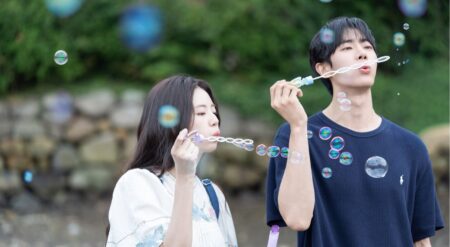
At just an hour and 25-minutes, My Broken Mariko leaves a large emotional impact by examining grief, guilt, and regret. Based on the hit manga of the same name by mangaka Hirako Waka (available in English by Yen Press), My Broken Mariko is directed by Yuki Tanada, and adapted to the screen by Tanada and Kôsuke Mukai. It stars Mei Nagano, Masataka Kubota, and Nao.
A story about correcting the past and grief, My Broken Mariko centers on Tomoyo Shiino, an overworked office worker. One day while on lunch hour, she hears a report on the news detailing the suicide of a woman named Mariko. Tomoyo immediately panics, thinking of her childhood friend, only to have her fears realized.
With jumbled memories of her school days, she attempts to pay her respects only to find that Mariko’s ashes are being kept by her father. While family keeping ashes is normal, Mariko’s father was also her tormentor, beating her as a child and sexually assaulting Mariko in her adolescence. Filled with rage, Tomoyo steals Mariko at knifepoint and decides to take her best friend to the beach, laying her to rest where she has always wanted to be.
This grief pilgrimage isn’t focused; Tomoyo searches through her memories for every bit of Mariko that she can, reading letters sent to her by her best friend in the process. But when a motorcyclist steals Tomoyo’s purse, which includes the letters from Mariko, Tomoyo begins to break as she clings to any piece of Mariko that she can, including the painful ones.
This live-action adaptation captures the beauty of some of Waka’s most stunning panels, and Mei Nahano’s performance as Tomoyo resonates with heartbreaking clarity. The original manga came to me when I was struggling with my own grief, and in every moment of breaking, I felt the journey, and to put it simply, I was a mess. I’m happy to say that this film packs the same emotional gut punch that the manga does, while the caliber of Nagano’s performance allows the film to stand on its own.
I can’t really put into words how important My Broken Mariko’s representation of what happens to those who love you after suicide is. It hits like a truck to see Tomoyo’s pain in losing her friend as she rakes herself over the coals for “letting it happen.” The pain she feels struggling to hold onto any memory she can, even when Mariko annoyed her and tested her patience. Grief is a process of understanding the hole people leave in our lives while grasping to remember their smile, their voice, every single thing we can about them. This is captured here with a beauty and a rage that Nagano captures wonderfully in her performance.
When Tomoyo screams, you know why. Not because the script says to, but because she’s reacting to a fear and a pain that ripples through every moment of her life. Tomoyo’s grief is vast and deep, with resentment and guilt being revealed as she processes her past and holds herself accountable to the future. There is a fire in Tomoyo that, when nearly extinguished, finds hope in the tragedy in order to keep living.
But where Tomoyo is explosive and uncontrollable, Mariko is somber, fragile, often sweet, and at moments funny. As Tomoyo combs through her past, we see effortlessly worked in flashbacks that detail the two girls’ friendship and Mariko’s struggle. As Mariko, Nao brings a melancholy beauty, appearing with thin smiles and bruises in new places each time we see her. Stuck and feeling broken, the Mariko we see through Tomoyo’s eyes is dynamic in her pain but also in her joy.
As she recounts her trauma to Mariko, blaming herself and describing herself as “broken,” there is a quiet resilience that’s running on empty and is indescribable in Nao’s performance. Additionally, Tanada refrains from drowning the audience in visual representations of Mariko’s trauma, opting to focus on emotional impact instead of direct and painful examples.
The only thing that keeps My Broken Mariko from perfection is slight issues in pacing that push Tomoyo out of certain moments too quickly and into the next. That said, a beautiful and painful adaptation of a beautiful and painful manga, My Broken Mariko effectively captures the grief of survival as much as for those we’ve lost. I hope with all of my heart that American audiences will get to enjoy My Broken Mariko as much as I have.
My Broken Mariko
-
Rating - 8.5/108.5/10
TL;DR
…A beautiful and painful adaptation of a beautiful and painful manga, My Broken Mariko effectively captures the grief of survival as much as for those we’ve lost. I hope with all of my heart that American audiences will get to enjoy My Broken Mariko as much as I have.






